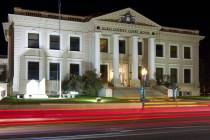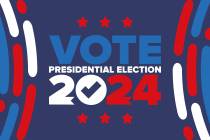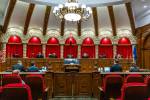Governor considers vetoing ‘green’ tax break suspension
CARSON CITY -- Gov. Jim Gibbons said Thursday he will likely veto emergency legislation temporarily suspending sales and property tax breaks for energy efficient building projects because of concerns the measure could lead to lawsuits involving the state.
"If it comes over the way it is, and our concerns are as high as they are right now, there is a likelihood I will veto the bill simply because I don't think it protects the state of Nevada," he said.
"I have some serious concerns about what the bill actually says. And I'm very concerned about engaging the state of Nevada in a potential lawsuit because it is not properly written."
Despite his concerns, Senate Bill 567 was unanimously passed by the Assembly on Thursday. Gibbons cannot receive the bill until Monday, however.
The measure, which passed the Senate on Wednesday on a 19-2 vote, was unchanged from the way it was originally introduced.
The votes in support of the bill are far more than the two-thirds needed to override a veto if lawmakers do not change their positions.
Assembly Speaker Barbara Buckley, D-Las Vegas, said one analysis she saw showed that keeping the tax breaks would cost the Clark County School District $700 million to $900 million in revenue over the next 10 years.
Any shortfall in local tax revenue would have to be made up by the state general fund.
"That was a good reason to act so swiftly," she said.
Buckley said the governor's lawyer, Joshua Hicks, told legislators that Gibbons only wanted to review the bill, not to veto it.
Assembly Minority Leader Garn Mabey, R-Las Vegas, said he and other legislative leaders discussed the need for the bill during a Tuesday luncheon and that he is convinced Gibbons will sign it into law.
"I would be surprised if he doesn't," Mabey said.
Hicks said Thursday that Gibbons and legislative leaders discussed their concerns and were trying to reach agreement on the legislation.
During a brief floor debate, Assemblywoman Marilyn Kirkpatrick, D-Las Vegas, reiterated the bill only calls for a temporary, 30-day suspension of the tax break program.
She said the delay will give the Legislature time to assess how much revenue schools will lose because of the energy efficient law and then take appropriate actions in another bill.
She claimed the Legislature still was making a commitment that it supports "green" laws designed to induce construction of more energy efficient buildings.
But Assemblywoman Debbie Smith, D-Sparks, said the first obligation of legislators is "to take care of our schools and the citizens of our state."
Gibbons said his concerns are that companies have relied on provisions of the 2005 legislation to move forward with green energy construction projects and now could see their investments affected by the tax break repeal.
"I think we have some suggestions we want to put in there," he said in comments before the Assembly vote.
One possible change would be to grandfather in those companies that have already moved forward with projects, Gibbons said.
During the Assembly hearing, Assemblyman James Settelmeyer, R-Gardnerville, said under the legal doctrine of "detrimental reference," all companies that have applied or received the tax breaks already could not have those benefits rescinded by the Legislature.
"For those who have expended money on those projects, the law would grant them relief," he said.
Buckley agreed in an interview that the Legislature cannot now block some of the companies from continuing to receive the tax breaks.
"It is evident we will lose some money," she said.
But Buckley said there are some companies who have not completed all the steps to qualify for the tax breaks. If the Legislature acts now, then it may be able to block them from receiving those breaks, she said.
The tax breaks, approved in Assembly Bill 3 in the 2005 special legislative session, include sales and property tax relief for building projects that meet Leadership in Energy and Environmental Design standards. One project already taking advantage of the tax breaks is the $7.4 billion City Center project in Las Vegas.
The purpose of the legislation was to encourage construction to become less dependent on costly energy production.
The emergency bill would suspend the authority of the Tax Commission, the Office of Energy, the Commission on Economic Development and the Department of Taxation from adopting any regulations or accepting or processing any further applications under the program.
The Tax Commission has a meeting set for Monday in part to consider issues surrounding AB3 of the 2005 special session.
Although the bill suspending the law will not be approved before that meeting, Buckley said the Tax Commission is aware of the Legislature's concerns, and she expressed confidence that members would not act on those issues.
Gibbons said the language in the bill was still being reviewed by his legal staff to determine its effects.
"What this bill may actually do is force some companies who have already taken action to their detriment in reliance on a current and existing law or statute now to be changed in the middle of the stream, causing the state of Nevada to be party to a lawsuit," he said. "These people relied, as they should have, on what the statute said.
"To now take and withdraw that offer, in the middle after they have made those expenditures" could expose the state to costly lawsuits, Gibbons said.
Lawmakers knew in 2005 when they approved the legislation providing the tax breaks that there would be a financial impact to government revenues, he said.
The Nevada Tax Commission unanimously voted last June to loosen standards for sales tax exemptions on "green" buildings and opened the door for more projects to qualify retroactively, according to a review of minutes from the meeting.
The commission's action figured in a rush by developers of big projects to seek the tax breaks
The Legislature voted to temporarily suspend the tax breaks because of concerns they are having a significant impact on the state budget for the coming two years.
The state general fund may have to bail out public schools budget in the next two years by as much as $81 million because of lower sales tax revenues, due in part to the tax break from school and local government sales taxes for green projects.
Sen. Randolph Townsend, R-Reno, said Wednesday the purpose of the legislation was to give the Legislature 30 days to "take a deep breath" and examine the future fiscal effects of the tax breaks.
He had no comment Thursday about Gibbons' potential veto.
"If he's announced that, I guess I will have to hear it from him," Townsend said. "I'll talk to him about it, and then I'll have a comment for you guys."
Companies planning to take advantage of the sales tax break under the program had to apply during a 90-day window between Oct. 1 and Dec. 31 of 2005.
But property tax breaks could still be in effect for green building projects. The 2005 legislation provides for property tax breaks of up to 50 percent per year for up to 10 years.
The Associated Press contributed to this report.
2007
Nevada Legislature























